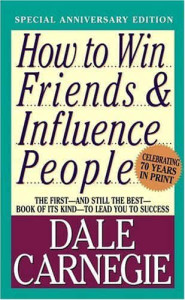Shamelessly inspired by this list of Julien Smith’s.
I seriously ramped up my reading habit in 2012, and this month I successfully stuck with my new goal of 25 pages a day.
The reading list I have slowly constructed over the years is a tome in itself, so I look forward to keeping this pace and making a significant dent in it during 2013.
Here are 24 takeaways from the 12 books I read this year:
How To Win Friends and Influence People by Dale Carnegie
1. Speaking in terms of the other person’s interests is a foolproof way to win them over.
2. This book should be required reading by every person, ever. Every year. For the rest of their lives.
The Flinch by Julien Smith
3. Live life so that your childhood self would be proud of you- not embarrassed.
4. Deliberately taking an ice cold shower is an extremely liberating and empowering feeling.
He’s Just Not That Into You by Greg Behrendt and Liz Tuccillo
5. There is no ‘semi-interested’ when it comes to dating. If a man is interested enough in a woman to go on a date with her, he will ask her out. End of story.
6. When a person that is stupidly successful in all areas of their life gives you a reading recommendation that seems exceedingly counter-intuitive, drop everything and go and read it.
The 4-Hour Work Week by Tim Ferriss
7. When you wake up in the morning, do your most important thing first– even before you check your email, look at your phone, or surf online.
8. Tim Ferriss has an incredible knack for making difficult things sound extremely simple and easy to accomplish.
Conversations with God by Neale Donald Walsch
9. If there is a God, I want it/him/Him/her/Her to be exactly like the one in this book.
10. The meaning of life isn’t to find yourself, it’s to create yourself. And every action during every second of every day you are in a moment of pure creation.
Outliers by Malcolm Gladwell
11. How successful a child will be in competitive athletics is heavily influenced by their birth month.
12. Asian children “get” math better than kids in the Western world because their numbers are less syllables (allowing them to memorize more numbers in less time) and their counting system follows a more logical pattern.
The Art of Non-Conformity by Chris Guillebeau
13. Writing 1,000 words a day is a lot easier than it sounds, and pivotal in my success as a writer.
14. People, especially close friends and family, are going to think you are batshit insane for pursuing a location-independent lifestyle. It’s important to ignore these people (where appropriate).
Connected by Nicholas A. Christakis and James H. Fowler
15. If you are overweight, you likely have many friends and family members who are overweight, too.
16. In a study of thousands of adults, 68% met their spouses by being introduced by someone they knew, while only 32% met via self-introduction. People rely on introductions to find prospective partners, as there is more information readily available about them from the get-go.
Strong Enough? by Mark Rippetoe
17. The closer an athlete is to their genetic potential, the slower their gains and progress will be.
18. Weightlifting gloves are silly devices promoted by fitness magazines that actually make it harder to grip a heavy and fast-moving barbell.
The Perks of Being a Wallflower by Stephen Chbosky
19. It’s remarkable how many people have uncannily similar high school experiences, yet at the time you feel that nobody could ever understand what you are going through.
20. There is no better word than ‘infinite’ to describe the feeling that cruising around with your friends while the windows are down and the music is up gives.
Inverting the Pyramid by Jonathan Wilson
21. Soccer tactics are derived from two components: formation (where the players are positioned in relation to each other) and style (how they move with and without the ball).
22. Some of the biggest tactical impacts in soccer came from several surprising sources: Scotland, Austria, and the Soviet Union.
Accidental Genius by Mark Levy
23. Freewriting is much more than a way to produce a large volume of writing; it can be a way to come up with solutions to virtually any problem you face in life.
24. When I read, I need to start highlighting, underlining, and marking the hell out of my books: “There’s too much to read, learn, and do in this life, and unless a volume stands out as particularly worthy, you’ll probably only thumb through it again to consult your highlights.”
















